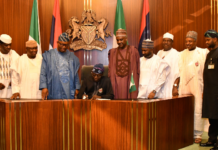THE Nigeria Labour Congress (NLC), today, continued its protest in Abuja over the prolonged strike by university workers across the country.
This comes a day after a similar demonstration was held in various states of the Federation, except in the Federal Capital Territory (FCT).
The protest began at about 9:30am after members of the NLC leadership and leaders of various affiliated unions, as well as members converged on the Unity Fountain in the nation’s capital.
Among those physically present were the NLC President, Ayuba Wabba; ASUU President, Professor Emmanuel Osodeke; and the immediate past President of the academic union, Professor Biodun Ogunyemi, among others.
It was also observed a heavy security presence at the venue of the protest mostly made up of personnel of the Nigeria Police.
The protesters plan to march to the National Assembly where the NLC president will deliver a message from the labour unions to the lawmakers.
University workers, including members of the Academic Staff Union of Universities (ASUU), Senior Staff Association of Universities (SSANU), Non-Academic Staff Union of Universities (NASU), and National Association of Academic Technologists (NAAT), had gone on strike for various reasons.
Lecturers in government-owned universities – affiliated with ASUU – embarked on a nationwide strike on February 14 over the adoption of the Integrated Personnel Payroll Information System (IPPIS) of the government as the payment system in the university sector, as well as poor funding of universities, and non-payment of salaries and allowances of some of their colleagues, among other issues.
Since the industrial action began, several negotiations between the union and the government have ended in deadlock.
While the government is still struggling to resolve the issues raised by the striking lecturers, the crisis in the public universities may not end soon as other university unions have also voiced their concerns.
The NLC, in its reaction, faulted the Federal Government over its handling of the industrial actions that have crippled activities in public institutions.
It also called on the government to pay the salaries of the striking workers, which it said had since “been frozen on the premise of the so-called ‘no work-no pay’ policy”.











